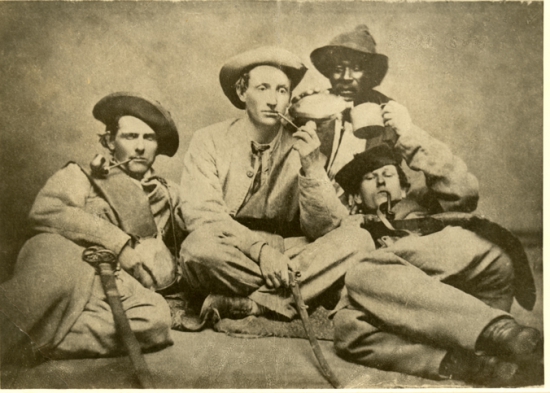
Genealogy of Blacks
who Served with the Confederate States Army
Overcoming the Top 9 Inhibitors to Joining Lineage Organizations

Hints and Tips to Save Valuable Time
1.) Understand when vital records were issued by the state in which the ancestor being researched lived. Do not spend time looking for a vital record that does not exist.
As an example: South Carolina did not issue marriage licenses until 1911; birth and death certificates were not issued until 1915.1 Many people did not obtain delayed birth certificates after 1915. Here is why. If a person in a southern state was born before 1915 and gainfully self-employed during 1915 and beyond, there was no need for a delayed birth certificate. The individual born before 1915 would only need a birth certificate if assistance was needed from the state or federal government.
2.) Research the date when your ancestor died and the date when African-Americans were approved to receive Confederate pensions.
As an example: South Carolina "Act No. 63, 1923 S.C. Acts 107 allowed African Americans who had served at least six months as cooks, servants, or attendants to apply for a pension."3 Thus, if an ancestor died in 1906, he would not have received a pension because pensions for African-Americans were not allowed until 1923.
3.) Ask questions when invited to attend meetings and when you receive a written invitation to become a member of a lineage organization. Normally, this simply means that you are invited to prove your lineage and submit an application--nothing more, nothing less.
4.) Draw a timeline. If you find the name of your ancestor on a Confederate Soldier Service record, know the dates.
As an example: If your Confederate ancestor served/enlisted in the Confederate States Army between 1861-1865 in one city and his name also appears on a census record in another city in 1900 (MCM), be leery of someone who tells you that soldiers lived forever in the same area where they enlisted. In this example, the ascertain is that the Black Confederate ancester would still be living in the same vicinity in which he enlisted and would have never moved to a different town--35 years later.
5.) Understand ways African-Americans acquired land. Some former slaveholders, many who were likewise United Confederate Veterans, gave land to former slaves for years of service. As an example, Scott, a former slave who served with the Fifty-seventh (57th) Georgia Regiment CSA, was awarded land by the family of First Lieutenant Archiblad C. McKinley after the War Between the States.4 [Courtesy of Georgia College, see the picture of Scott on the left.]
As an example, Scott, a former slave who served with the Fifty-seventh (57th) Georgia Regiment CSA, was awarded land by the family of First Lieutenant Archiblad C. McKinley after the War Between the States.4 [Courtesy of Georgia College, see the picture of Scott on the left.]
Though Union General William Tecumseh Sherman offered 40 acres to African-Americans under Special Field Orders, No. 15, this proposition was later retracted by then President Andrew Johnson.5 However, based on an article in the October 1913 issue of the Confederate Veteran, some United Confederate Veterans advocated awarding former faithful slaves pensions and a proposed ex-slaves' home. The article states, "It is right and politic..."6
6.) Find the map for the county/district in which your ancestor was born/died. The 1861-1865 county/district may not be the same landscape as the county/district of 2012. A town in 1861-1865 may now be in a different county in 2012. Compare 19th Century Confederate Records to 19th Century county/district maps.
7.) Locate 19th Century family bibles, family accounting records, and church records as a source when state vital records are not available. However, be cognizant that slaveholder descendants may still possess these private family bibles and accounting records. They may have DNA records. However, they may be unwilling to share this information about your ancestor with you and pull away. Slaves were categorized as private property in the 19th century. The United States Census Slave Schedules only show age/sex and not slave name. Also, be aware that southern lineage organizations do not accept DNA as proof of lineage. For descendants of former slaves who were noted as mulatto on census records, there is little hope of joining lineage organizations due to the lack of vital records during the 19th century.
8.) Note that finding a newspaper article about a specific African-American during the Civil War and Post-Civil War era is rare.
I predict that many African-Americans who are against learning Confederate history will wake up one day wishing that the United Confederate Veterans or Sons of Confederate Veterans wrote an article about their African-American loved one. These types of documents are vital to proving Confederate military service as well as lineage. Once appreciated for preserving southern heritage, organizations such as the Sons of Confederate Veterans will no longer be considered Neo-Confederates.
9.) Find the grave of your ancestor. Grave markers and tombstones may have important family history. Relatives are often buried in the same graves. Cemeteries may be a link to race. As an example, if a relative is buried in an African-American cemetery, the odds are high that your ancestor was African-American. However, there are a few cemeteries where 19th century plantation owners and slaves are buried in the same or adjoining cemeteries. Local historical societies often have cemetery survey books.
A word of wisdom: Genealogical research for Black Confederates is not for the faint of heart. The overarching question is: Why have doors and windows if they do not open?
Highlighting the good in humanity,
Ann DeWitt

1South Carolina Department of Archives & History: Research at the Archives. “Genealogy Resources at the Archives.” Web. 5 October 2011.
http://archives.sc.gov/recordsheld/Pages/GenealogyResources.aspx
2 "Ghetto Grandmothers." Youtube: ajcjgalloway Channel. Web. 16 June 2012.
http://www.youtube.com/watch?v=d4zfxnSKI3Y
3"South Carolina Archives Series Description: Confederate Pension Applications, 1919-1938." Web. 16 June 2012.
http://www.archivesindex.sc.gov/onlinearchives/Terms/Series/SeriesDescriptions/s126088.html
4Walker, Scott. Hell's Broke Loose in Georgia: Survival in a Civil War Regiment. Georgia: University of Georgia Press. 2005. Print.
5"Sherman's Field Order No. 15." New Georgia Encyclopedia.Web. 16 June 2012. http://www.georgiaencyclopedia.org/nge/Article.jsp?id=h-3353
6"Pension Slaves Who Served in the War." The Confederate Veteran Magazine 1913: October 1913 Vol. XXI. No. 10. Pennsylvania: The National Historical Society. 481. Print.
| Site Map |